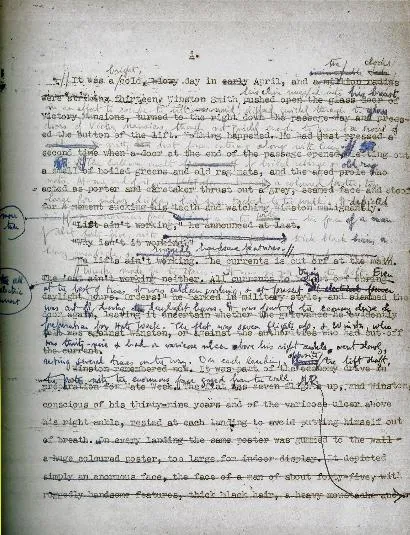George Orwell Wrote ‘1984’ While Dying of Tuberculosis
Orwell, like thousands around the globe today, struggled with tuberculosis for many years before finally succumbing to the disease
/https://tf-cmsv2-smithsonianmag-media.s3.amazonaws.com/filer/e0/b5/e0b55ff3-0a1d-4022-879a-8a32d0b54546/senate_house_of_the_university_of_london_-_panoramio.jpg)
1984 is probably the best-known dystopian novel, and it was written by a man whose own life turned into a dystopia while he composed it.
In 1946, George Orwell traveled to the house of an acquaintance in Scotland to write his final book. He had been suffering from tuberculosis for a long time, although it’s hard to know how long exactly. He could have been infected as a child in India or during his years of travelling afterwards, the author of a study on Orwell’s illness said in a press release published on Science Daily in 2005. But he hadn’t yet been formally diagnosed.
A study by John Ross published in Infectious Diseases, indicates that Orwell, whose real name was Eric Blair, experienced terrible suffering because of his disease and the complications it caused. Those experiences may have helped make the suffering of the main character of 1984, Winston, more realistic.
As he was working on the first draft of his novel, Orwell got sicker and sicker, Science Daily writes. “Fever, weight loss and night sweats sent him to the hospital where he underwent ‘collapse therapy,’ a treatment designed to close the dangerous cavities that form in the chests of tuberculosis patients.” He wrote about the treatment, and it may have helped color the descriptions of the torture Winston undergoes at the Ministry of Love, Ross told the publication.
But the most vivid image that Ross believes came from Orwell’s illness was that of Winston’s body after torment and starvation. “But the truly frightening thing was the emaciation of his body,” Orwell wrote in the book. “The barrel of the ribs was as narrow as that of a skeleton: the legs had shrunk so that the knees were thicker than the thighs… the curvature of the spine was astonishing.” The author may well have been drawing on his personal experience of the “wasting” associated with tuberculosis.
Western literary history is full of tuberculosis sufferers, and it is a disease that is often seen as being historical, although it still affects millions of people each year. Orwell’s twentieth-century experience of the disease likely had direct influence on his authorship what many have characterized as the novel of the century, writes Robert Crum for The Guardian.

“The circumstances surrounding the writing of 1984 make a haunting narrative that helps to explain the bleakness of Orwell’s dystopia,” he writes. “Here was an English writer, desperately sick, grappling alone with the demons of his imagination in a bleak Scottish outpost in the desolate aftermath of the second world war.”
The author had been thinking about the ideas behind the book since the 1930s, Crum writes, but it was only after the experience of the war and the death of his wife Eileen Blair that the book began to come together. Then he went to a remote Scottish island to write it at the house of a friend. His adopted son Richard, Richard’s caregiver and Orwell’s sister Avril all came to stay with him.
Orwell had struggled with health throughout his life, but in the cold and damp of Scotland, under the stress of writing, he got worse and worse, finally being formally diagnosed with tuberculosis in 1947. After the diagnosis, prompted by his publisher, he drove himself harder and harder. After handing the book in to his publisher, it was published in mid-1949. He died in January 1950, aged 46.
Although the prose of the finished 1984 seems as bright and cold as the day in April on which the book begins, McCrum argues that the book's power was the product of obsessive revision made at the cost of the novelist’s always-shaky health.
Ross argues, though, that the experience of chronic illness made Orwell “a better and more empathetic writer, in that his sense of suffering made his writing more universal.” Perhaps that's one of the reasons his book remains popular today.